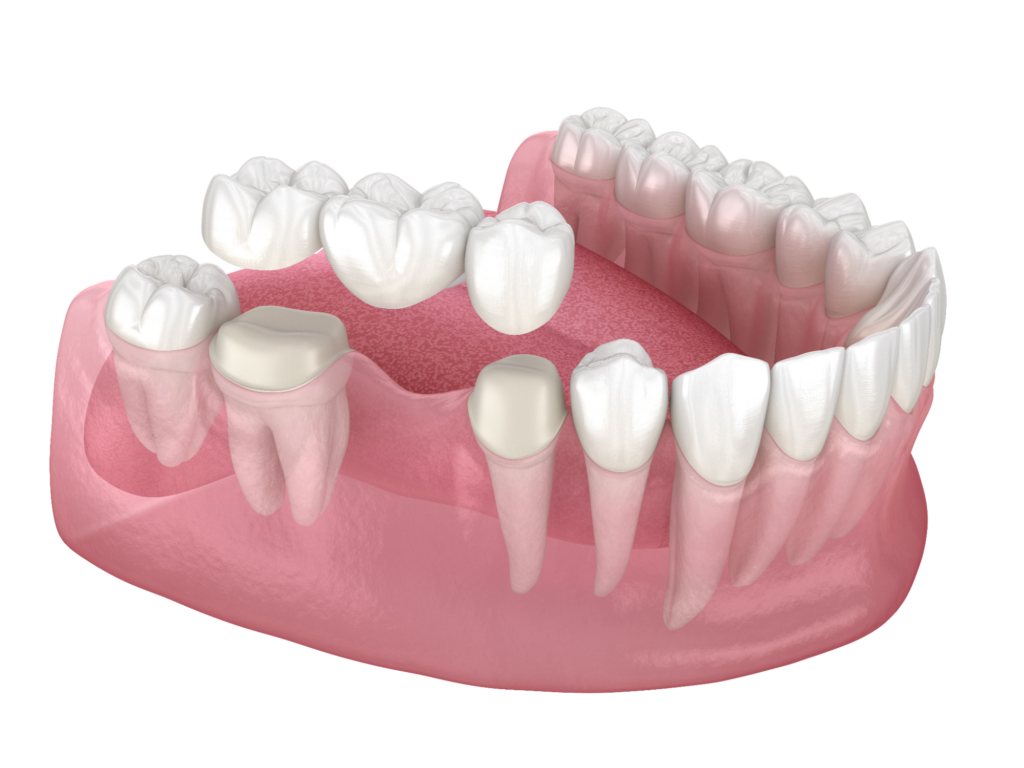What Are Dental Bridges?
Studies indicate that one in 25 persons aged 15 and above have lost some or all of their natural teeth. A dental bridge offers an effective way to solve the problem artificially.
A dental bridge is a natural-looking restoration formula that ‘bridges’ over the gap that missing teeth leave. They depend on teeth on either side of the missing tooth for anchorage and a fake (pontic) tooth to fill the space in between.
Your dentist will first need to establish whether you’re a perfect candidate for a dental bridge and the type that best suits you. This process involves performing an oral examination of the gap’s location in your mouth.
The dentist will also examine the anchor teeth to establish whether they’re sufficiently strong to hold the dental prosthetic. This process may entail removing existing fillings to see the 3D reality of the volume of tooth structure left and/or taking dental x-rays to reveal the state of the fundamental structures.
4 Types of Dental Bridges
Maintaining proper oral hygiene helps you cut down on the high cost of dental care. But once you have missing teeth, a dental bridge offers sufficient restoration. Here are four common kinds of dental bridges to consider.
Traditional Dental Bridges
Prior to the advent of dental implants, traditional dental bridges were the most widely-used method of replacing a missing tooth or teeth if you have natural teeth on both sides of the gap. They include a single or more fake teeth, which depend on the support of abutment teeth to stay in place. The dentist gives abutment (natural teeth) dental crowns to anchor their pontic(s) to those crowns.
Traditional dental bridges are manufactured using porcelain or ceramic fused to metal. Thus, they’re the strongest and a good option if you’re looking to replace the molars. But, installing a traditional dental bridge means your dentist will modify the supporting teeth (remove enamel).
Since enamel won’t grow back after modification, your natural supporting teeth will have to stay under crown protection even if you decide to use a different type of dental bridge.
Today, implants are a superior option to traditional bridges because implants do not require tooth structure removal (and hence crowns) to be placed on the adjacent teeth. The only scenario where a traditional bridge should be considered is if the abutment teeth are already heavily filled and both teeth already are in crowns in their own right.
Cantilever Dental Bridges
Cantilever bridges are almost similar to their traditional counterparts, but cantilever bridges only require attachment on a single abutment tooth. They’re most suitable for placing towards the front of your mouth or a small gap at the back.
Installing a cantilever dental bridge is relatively straightforward, hence a good save for your time and money (if you’re a perfect candidate).
While installing, your dentist will have to modify the adjacent tooth to anchor the bridge. The chance of suffering complications like loosened dental crowns or fractured teeth is higher with a cantilever dental bridge – that is why proper case selection is important. This type of bridge is suitable in a limited number of situations.
Maryland Bridges
Maryland bridges are sometimes referred to as resin-bound bridges. They’re a perfect choice for replacing a missing front tooth. Their installation involves binding a pontic tooth to the backs of nearby natural teeth using porcelain on a metal base.
Unlike traditional and cantilever bridges, a Maryland dental bridge requires only a very small amount of tooth structure removal from the backs of the adjacent anchoring tooth to the gap. Thus, they’re often considered conservative and affordable alternatives to their traditional counterparts.
However, they’re less robust and only remain in shape if the binding component stays in place. They’re unsuitable for replacing molars, as the teeth experience relatively higher chewing and biting force. Also, you may suffer tooth discolouration due to the metal framework, although this is uncommon.
Implant-Supported Bridges
Implant-supported bridges depend on dental implants for support. Their installation procedure has some similarities to a traditional dental bridge, except they use implants rather than natural teeth for support. One main difference is that traditional bridges are held in place by cement while implant bridges are connected to the implants via a screw system.
They’re ideal if you are missing multiple teeth.
Dentists suspend a false tooth or teeth between two or more implant-supported crowns, depending on the span of the gap. Implant-supported bridges require surgery. Thus, you need to prepare for a lengthy healing process which could take a couple of months before the bridge can be inserted into the implants.
But, they’re an excellent choice for large gaps with no supporting natural teeth. They’re equally strong, durable, and offer the ability to resume regular teeth and jaw function.
Advantages of Dental Bridges
A dental bridge comes with several advantages. Here are some reasons you may consider replacing missing teeth.
Restoring Your Beautiful Smile
Limiting the chances of bone loss, hence maintaining your face structure. Unlike dentures, bridges are permanent; thus, they don’t move. Your remaining natural tooth can’t shift since there’s no gap to lean on. Restoring your natural facial, mouth, and smile appearance.
A dental bridge can last you many years. However, proper care and maintenance will see you maximise the life of the bridge. Like your normal tooth, you need to maintain adequate oral hygiene to prevent cavities or gum disease from occurring on the anchoring teeth of the bridge.
There are many different dental bridges available on the market today. Talk to your dentist to understand which one best suits your needs and situation. Our skilled professionals are available to help you make the right decision and regain your beautiful smile again. Contact us for a professional examination and guidance.
Read More:


